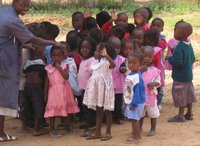Debunking the Fallacy of "Limited Good"
Some people might be wondering (though nobody has asked) why I spend so much time learning culture and language while in Mozambique. After all, if we're only spending a year here, wouldn't success be easier to come by if I just focused on the task at hand?
The reality is that success will not be possible unless I learn the culture of Mozambique as fully and completely as possible. A cultural lesson that I learned this week highlights this fact.
The people of Mozambique ascribe to a concept called "limited good": that everything, whether tangible (such as wealth) or intangible (such as happiness) is in limited supply, and that one person having an abundance of anything means that someone else will be lacking in it.
All facets of life are seen as zero-sum. If I have more health or wealth or happiness than my neighbour, he will perceive that I have stolen his share of it.
At first thought, this seems like a strange idea. Free-market capitalist societies have as a central tenet that wealth is in unlimited supply; that it can and is created (albeit not distributed evenly) every day.
(Armchair economists viewing the world from the left or the right of the political spectrum will forever argue the veracity of this point.)
Upon further reflection, one must admit that the idea of limited good lurks just beneath the surface even in our own culture. It rears its head in the form of jealousy when a colleague gets a coveted promotion, or when a neighbour buys a shiny new car, or when a friend is publicly recognized for a good deed.
The theory of limited good has profound implications for our chicken farming strategy, and for economic development projects in general. It makes no difference whether or not the theory is true; because people believe it, their actions will be shaped by it.
If our project is to be successful, we need to create the conditions necessary to avoid both jealousy on the part of those who don't participate, and a deliberate undermining of success on the part of those selected in an effort to avoid standing out from the pack.
The collective nature of African culture prevents individuals from wanting to distance themselves from their neighbours. Those who do find success may fear recrimination from jealous family and witchcraft-practicing neighbours.
Chicken farming in Mozambique is a good idea with plenty of winners. Consumers will have access to a better diet. Producers will have more wealth to help their family survive and to spend at their neighbour's fruit stands and bakeries.
Prosperity, without greed, has a multiplication effect that allows everyone to win.
While we may debate the limits of tangible goods, we should never doubt that the intangibles -- things like happiness -- are in limitless supply. God permits -- indeed, God wants -- all of us to live good and righteous lives.
If the concept of limited good is applied to these intangibles, it serves only to drive a wedge between ourselves and God in an effort to preserve harmony among people. If instead we could recognize that "good" is not a commodity in limited supply, we would all be better neighbours and global citizens.
If the people of Mozambique could realize that good begets good, they may be more motivated to lift themselves out of the proverbial muck.


















